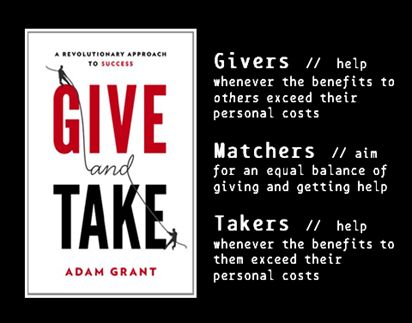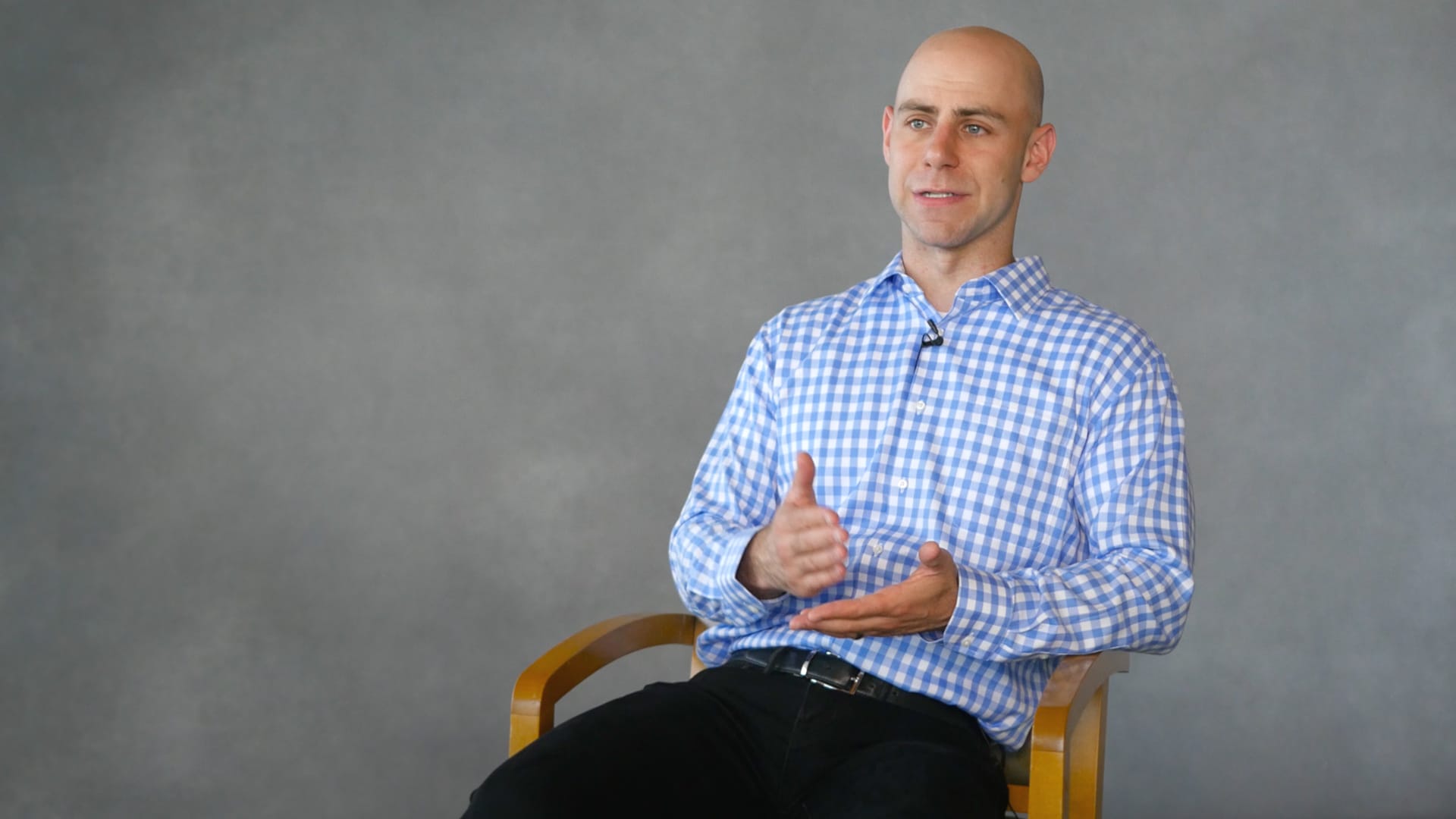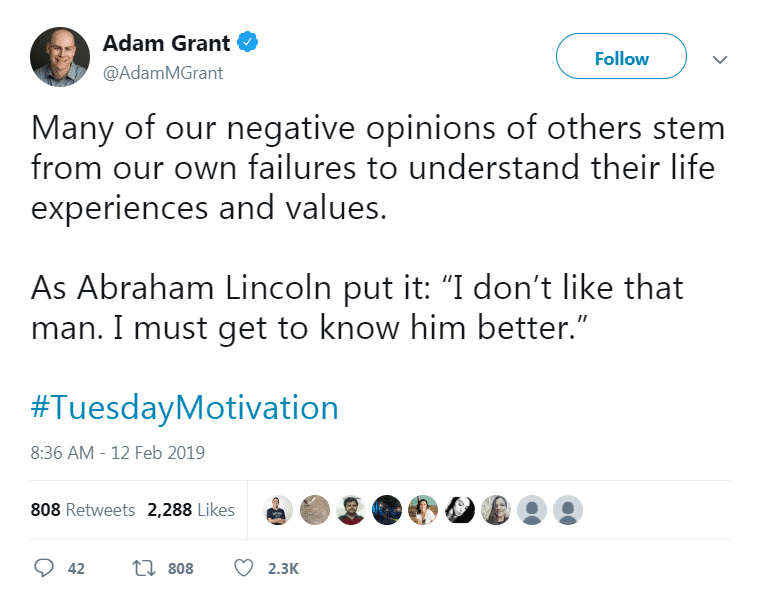Adam Grant sends a message to the world in his book ‘Give and Take: Why Helping Others Drives Our Success.‘
The message is that success doesn’t have to come at others expense!
Grant is a talented storyteller and researcher. He earned his Bachelors from Harvard University and received his Masters and PhD from the University of Michigan.
He graduated with Phi Beta Kappa honours, ‘magna cum laude’ with highest honours, and the Highest Academic Achievement by the John Harvard Scholarship.
Grant was recognised as the top-rated teacher at Wharton School of Business for five years in a row.
He was also named among the world’s 25 most influential management thinkers, the top 40 business professors under 40, the 100 most creative people in business, Malcolm Gladwell’s favourite thinkers and HR’s most influential international thinkers.
At the University of Pennsylvania, he is the youngest tenured Wharton professor within the School of Business.
His New York Times bestselling book ‘Give and Take’ is a splendid antidote for any doubt you might have about the recipe to success in business and life, and maybe a soft poke at people more concerned with getting what they can while giving only a little.

The book draws a perfect line between traditional storytelling, case studies, research, and factual information. Grant transcends self-help by giving the reader information that is supported by research.
He also presents his findings with finely composed examples. What is more gripping about Grant’s book is the remarkably broad range of information that got used to build support for his way of thinking.
Grant poses examples like the collapse of Enron and an analysis of its CEO.
In ‘Give and Take,’ Grant examines three styles of social interaction. Because he is a business professor, who has studied the jobs and life trajectories of the people he labels these styles as givers, takers, and matchers.
Grant proved that not only is taking bad for groups and society, but a worker with a taker mentality is also bad for any company’s growth.
Leaders who are takers lead their teams to the ground in most cases and typically end up shooting themselves in the foot in the long term.
Regardless of what your ideas are about who is more successful (givers or takers or matchers), this book will help renew your confidence in good leadership, its potential, and the future we are capable of creating.
Top five takeaways from Adam Grant’s book ‘Give and Take’.
1. The principle of reciprocity is not governed by self-interest
Adam Grant’s research revealed that in all professional environments, there are people that act as either takers, givers or matchers.
These interchangeable styles have a direct impact on why and how they succeed or fail.
The book shows that takers are only interested in self-advancement, always assessing what others can offer them.
While givers prefer to give more than they get, therefore paying more attention to what others need from them, rather than what they can get from others.
Matchers, on the other hand, are placed right in the middle. They try to create an equitable balance between giving and taking.
Matchers often operate on the policy of fairness; when they provide assistance and help to others, they get covered by the principle of reciprocity.
2. Takers have a unique profile and are easy to spot
You can spot a taker from some distinctive features. They like to receive more than they give and abide by the “dog eat dog world” policy.
Takers are selfish and like to self-promote their few good deeds so they can get recognition. They are a black hole because they can suck the energy from any group or system.
They have no resemblance to givers, who have a sunny disposition, and inject light into any organisation they find themselves in.
Look around your workplace and try to spot the takers.
They are those who want to pull you down so that they can climb to the top.
Takers will take credit for the work done in a team rather than share the praise.
3. The best leaders are givers
Givers are the most likely to experience long-term success, according to Adam Grant’s research in ‘Give and Take’.
The most effective leaders prefer to give rather than take.
Givers focus on what others need from them and endeavour to be generous with their time, knowledge, energy, skills, ideas and interactions with others.
One of the least self-centred, boastful, and egotistical American presidents ever was Abraham Lincoln. He was a giver.
The reason why givers make the best leaders is that they can create a psychologically safe climate where everyone feels they can contribute.
This type of environment is necessary for people to learn and be more innovative.
4. Teamwork without a giving mentality will fall short
Grant noted that givers do poorly in medical school when every task was an individual activity. They usually soar in the second year when they become part of teams and begin dealing with hospitals, nurses, and patients.
A strong team with more givers will have access to a free flow of information, knowledge, expertise and connection.
Takers and matchers are always strategic when utilising groups and teams.
Takers take without thought of giving back, depleting the teams’ resources and energy. At the same time, matchers focused on who could reciprocate in the nearest future, restricting the flow of information and knowledge.
When a group has more givers, then the group members contribute more, and the team’s objectives get met more quickly.
5. There is a fine line between a giver and a doormat
Givers are always at the top of every success ladder, and there are also some givers at the bottom. Those givers at the bottom did not know where to draw a line.
To avoid being a doormat leader, Grant explained the necessity for givers to create boundaries around their giving to prevent burn-out.
Boundaries will also help good leaders to overcome being taken advantage of by takers.
In this case, the giver will need to absorb some features of the matcher.
To do this well, the giver has to maintain a delicate balance of giving.
Doing this successfully without getting burned-out or taken advantage of, will create a vast network of allies and friends, plus an excellent reputation that will make them an asset for any professional organisation in the long-term.





